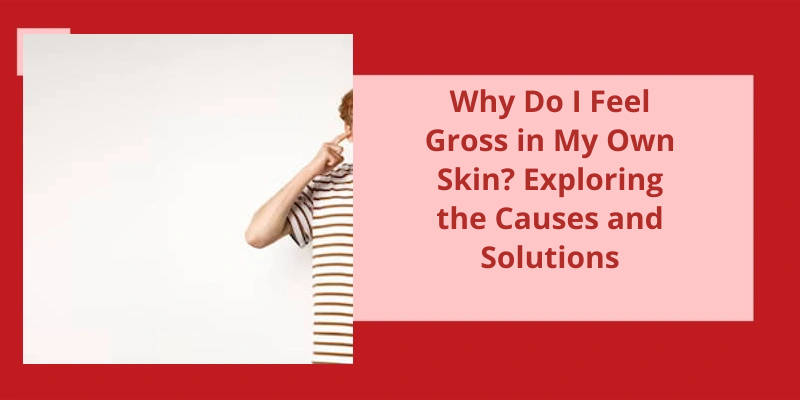Feeling gross in one's own skin is a complex and multifaceted experience that can have a profound impact on an individual's well-being and self-esteem. It can manifest in various ways, such as feeling uncomfortable in one's own body, having a negative body image, or experiencing a sense of disconnect from oneself. The causes of this feeling can be deeply personal and unique to each individual, ranging from societal pressures and unrealistic beauty standards to underlying mental health issues or traumatic experiences. In order to address and overcome this discomfort, it’s crucial to explore the root causes and potential solutions, which may involve self-reflection, seeking professional help, practicing self-care, and cultivating self-acceptance and self-love. Through a comprehensive exploration of the causes and solutions, individuals can begin to navigate their journey towards feeling comfortable and at ease in their own skin, ultimately leading to a healthier and more positive sense of self.
Why Am I Physically Uncomfortable in My Own Skin?
Feeling physically uncomfortable in your own skin can be a disconcerting and distressing experience. It may manifest as a general unease or a specific aversion to certain sensations within your body. While the causes of this discomfort can vary from person to person, there are several common factors that can contribute to this feeling.
Another factor that may contribute to feeling gross in your own skin is negative body image. Society places great emphasis on physical appearance, and many individuals internalize these societal standards, leading to feelings of self-consciousness or dissatisfaction with their bodies. This negative body image can manifest as discomfort or aversion to certain physical sensations.
Additionally, past traumatic experiences can also play a role in feeling uncomfortable in your own skin. Trauma can sensitize the nervous system, leading to hypervigilance and a heightened awareness of bodily sensations. This heightened awareness can intensify discomfort and make it difficult to relax and feel at ease.
Fortunately, there are effective approaches to managing these uncomfortable sensations. Cognitive behavioral therapy (CBT) and mindfulness techniques have been shown to be helpful in reducing distress related to bodily discomfort. CBT can help identify and challenge negative thought patterns related to body image, while mindfulness techniques can help develop a non-judgmental and accepting attitude towards bodily sensations.
However, there are strategies available to help cope with and manage these feelings. By engaging in these practices, individuals can gradually ease their discomfort and cultivate a more positive relationship with their bodies.
The Role of Self-Esteem and Self-Acceptance in Feeling Comfortable in One’s Own Skin
Self-esteem and self-acceptance play a crucial role in feeling comfortable in one’s own skin. When we’ve low self-esteem, we may constantly doubt ourselves, feel inadequate, and experience a general sense of worthlessness. This can make us feel gross in our own skin, as we’re unable to see and appreciate our own worth.
On the other hand, self-acceptance involves recognizing and embracing who we are, flaws and all. It involves acknowledging our strengths and weaknesses without judgment. When we’ve a strong sense of self-acceptance, we’re more likely to feel comfortable and at ease in our own skin.
Developing self-esteem and self-acceptance takes time and effort. It involves challenging negative self-perceptions, practicing self-compassion, and cultivating a positive self-image. Engaging in activities that promote self-care, setting achievable goals, and seeking support from loved ones can also contribute to building a healthy self-esteem and self-acceptance.
In conclusion, nurturing our self-esteem and fostering self-acceptance are key factors in feeling comfortable and at peace in our own skin. By working on these aspects, we can overcome the feeling of being “gross” and instead develop a positive relationship with ourselves.
Disgust is a powerful emotion that serves as a protective mechanism in our lives. However, when this feeling becomes overwhelming and interferes with our daily activities, it may be indicative of an underlying psychological condition. Disgust can be closely linked to disorders such as generalized anxiety disorder, obsessive-compulsive disorder, and specific phobias. Understanding the connection between these conditions and the experience of disgust can shed light on why some individuals suddenly feel disgusted by everything and how it impacts their lives.
Why Do I Suddenly Feel Disgusted by Everything?
Feeling suddenly disgusted by everything can be a distressing experience that interferes with ones daily life. While disgust is a normal emotion, when it becomes overwhelming and persistent, it can indicate the presence of various psychological conditions. One such condition is generalized anxiety disorder, where excessive worry and fear lead to heightened sensitivity towards perceived threats. In these cases, individuals may feel disgust as a defense mechanism to protect themselves from potential harm or contamination.
Obsessive-compulsive disorder (OCD) is another psychological condition in which disgust plays a significant role. Intrusive thoughts or obsessions can trigger intense feelings of disgust, and individuals may engage in repetitive behaviors, such as handwashing or cleaning, to alleviate their discomfort. The fear of germs or contamination is often a driving force behind these actions, as individuals strive to regain a sense of control and cleanliness.
Phobias of injury or animals can also evoke feelings of disgust. For instance, a person with a phobia of snakes may find them repulsive and experience intense disgust when confronted with them.
Finding solutions to feeling gross in your own skin can involve various strategies, depending on the underlying cause. In the case of generalized anxiety disorder, working with a therapist to develop coping mechanisms and address underlying fears can be beneficial. Cognitive-behavioral therapy (CBT) is often effective in helping individuals reframe negative thought patterns and manage anxiety.
For those struggling with OCD, exposure and response prevention therapy (ERP) is commonly utilized. This treatment involves gradually exposing individuals to their fears and helping them resist engaging in compulsive behaviors. Over time, this approach can reduce the power of disgust and anxiety in triggering compulsions.
Phobias can be addressed through exposure therapy as well, where individuals gradually confront their fears in a controlled and supportive environment. Therapists may also teach relaxation techniques and offer guidance to help individuals manage the distressing emotions associated with their phobias.
In addition to therapy, engaging in self-care practices like exercise, mindfulness, and healthy lifestyle choices can also contribute to improving overall well-being. It’s essential to reach out to a mental health professional for an accurate diagnosis and personalized treatment plan that addresses the underlying causes of feeling gross in your own skin. Remember, with appropriate care and support, it’s possible to regain a sense of comfort and confidence in oneself.
Body dysmorphic disorder (BDD) is a mental health condition that causes individuals to have a distorted perception of their own appearance. It goes beyond simply feeling self-conscious and can lead to significant distress and impairment in daily functioning. If you find yourself intensely disgusted by your body and it’s impacting various aspects of your life, it might be worth exploring the possibility of BDD.
Is It Normal to Feel Disgusted by Your Own Body?
Is it normal to feel disgusted by your own body? Everyone feels self-conscious about their body from time to time. However, if you hate something about your body and these feelings are interfering with your everyday life, you may have body dysmorphic disorder. Body dysmorphic disorder (BDD) is a mental health condition characterized by obsessive preoccupation with perceived flaws in ones appearance. It can cause intense distress and significantly impact an individuals quality of life.
There are several potential causes of feeling gross in your own skin. One possible cause is societal pressures and beauty standards. Social media, advertising, and societal expectations often portray idealized and unrealistic body images, which can lead to feelings of inadequacy and self-disgust. Comparing oneself to these unrealistic standards can exacerbate negative body image and contribute to body dysmorphic disorder.
Another potential cause is past traumatic experiences or instances of bullying related to ones appearance. These experiences can deeply affect an individuals self-esteem and body image, leading to feelings of disgust and discomfort in their own skin.
These conditions can distort ones perception of reality and exaggerate negative thoughts and emotions, including body image concerns.
Seeking professional help is essential. A mental health professional, such as a therapist or psychiatrist, can diagnose and treat body dysmorphic disorder. Treatment may involve cognitive-behavioral therapy (CBT), medication, or a combination of both. In therapy, individuals can learn coping strategies, challenge negative thought patterns, and develop a healthier relationship with their body.
Self-care practices, such as engaging in activities that promote body acceptance and self-love, can also be beneficial. These may include practicing mindfulness, engaging in regular physical activity that brings joy rather than focusing solely on appearance, surrounding oneself with positive influences and supportive individuals, and engaging in self-care routines that promote self-confidence and self-care.
Remember, everyone deserves to feel comfortable and confident in their own skin. It may take time and effort, but with the right support and resources, it’s possible to overcome feelings of disgust and develop a healthier relationship with your body.
Tips for Building Self-Confidence and Body Acceptance
Building self-confidence and body acceptance can be a gradual process, but there are steps you can take to help improve how you feel in your own skin.
1. Practice self-care: Taking care of yourself physically and mentally can boost your confidence. Make time for activities that you enjoy, eat nutritious foods, exercise regularly, and get enough sleep.
2. Challenge negative thoughts: Negative self-talk can contribute to feeling gross in your own skin. When you catch yourself thinking negatively about your body or appearance, try to challenge those thoughts and replace them with more positive and realistic ones.
3. Surround yourself with positive influences: Choose to spend time with people who uplift and support you. It’s important to be around individuals who value you for who you’re and make you feel good about yourself.
4. Focus on your strengths: Shift your attention away from your perceived flaws and instead focus on your strengths and accomplishments. Celebrate your achievements and remind yourself of your positive qualities.
5. Seek professional help if needed: If you’re struggling with body acceptance or self-confidence, consider reaching out to a therapist or counselor who can provide guidance and support.
Remember, building self-confidence and body acceptance takes time and effort. Be patient with yourself and practice self-compassion as you work towards feeling more comfortable and confident in your own skin.
Conclusion
It’s important to acknowledge and address these feelings, as they can significantly impact our mental and emotional well-being. By practicing self-care, seeking professional help or support from loved ones, challenging negative thoughts, and fostering self-acceptance, we can gradually cultivate a healthier and more positive relationship with ourselves. Remember that everyone is unique, and focusing on self-compassion and self-love can lead to a greater sense of contentment and fulfillment in our own skin.






